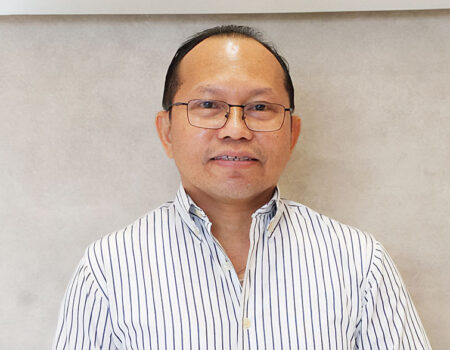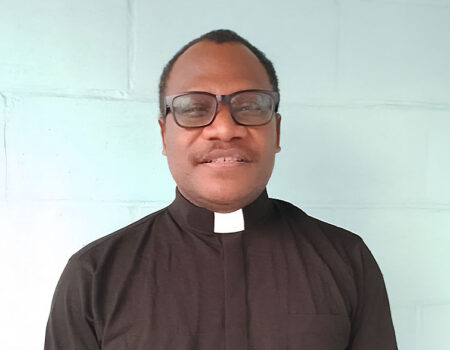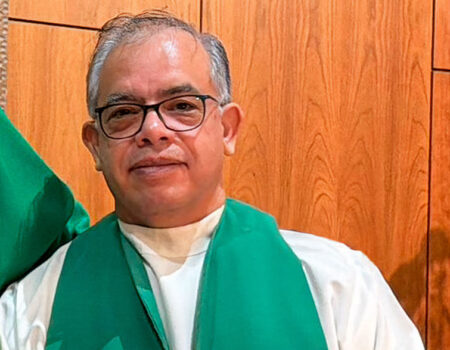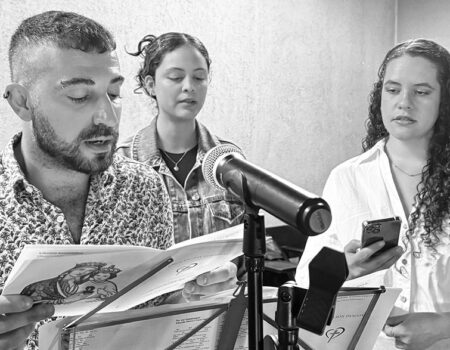A MSC parish in Europe
Tuesday October 22, 2024
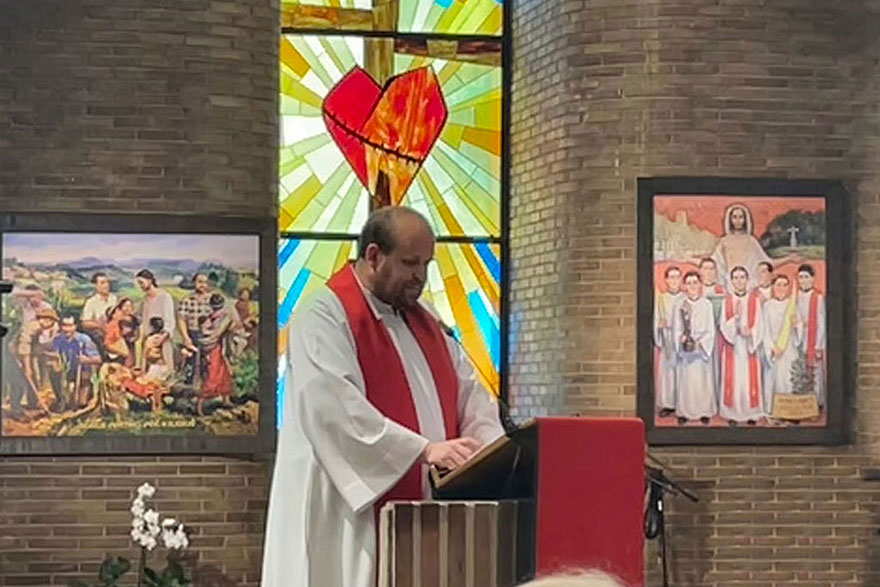
In this issue of the General Bulletin centred on the “Mission”, Fr. Jaime Rosique, msc, tells us how he manages his appointment as Parish priest in the Sanctuary of Our Lady of the Sacred Heart in Madrid, his concerns, his willingness to serve the Parish Community and, above all, the challenges underlying this way of making the Sacred Heart of Jesus be loved in an ever-growing secularised society as can be Europe in general and Spain in particular.
On the 4th of June, on the liturgical feast of the Blessed MSC Martyrs of El Quiché, Guatemala, I was appointed Parish Priest of the Our Lady of the Sacred Heart Parish that the MSC run in Madrid. To be honest, I feel a little bit like the prophet Jeremiah and many others called by God in the Old Testament. I feel small (for those who have met me in person, this adjective will put a smile on their face 😊). I consider myself inexperienced, but I am also very much aware of God´s response to these “complaints” or “excuses” of mine and of Moses, Jeremiah, Ezekiel and many others before me: “Do not be afraid, for I am with you”. With such certainty, I put in His hands the work ahead: Accompany the Parish Community during the next five years. And I say ‘Accompany’ because I think that is the primary mission of a parish priest.
A few years ago, during my formation time in Ireland, a close friend of mine was dealing with a delicate family situation. As I was regularly checking up on him and giving my words of encouragement and consolation, he said to me: “If to be a priest means to accompany people, you have already walked part of the way”. That phrase touched me, making me think about the truth it highlights. To be a priest is not re-inventing the wheel, neither is to change what is already working or trying to leave your “signature” in the parish at all costs: it is all about accompanying. In every accompaniment, one needs to learn when to be in front, when to be behind, and when to be next to the person you accompany. As I wrote in the Parish Bulletin following my appointment as Parish Priest, my main concern is “to give back to Caesar what belongs to Caesar, and to give back to God what belongs to God”. In this case, the Parish belongs to the Parish Community, to Caesar, and my priesthood belongs to God. I am merely an earthen vessel carrying two treasures: God and the Parish Community. In fact, I think it is in these last two words “Parish Community” lies ahead the major challenge for a parish priest, for a parish to build up community. What I have seen as a parishioner first and now as a priest in Madrid for the last year is the difficulty in achieving some sense of belonging to a parish. This is, I believe, also one of the greatest challenges of the “Mission” in Europe. Faith nowadays tends to be lived in a very individualistic, personalist way. There is a tendency to perceive a parish as a Service Station, as a sacramental dispenser, a place where one can be heard in confession, where one can attend Mass because he was late for the service of his/her own parish, because he preferred the Mass times, for he was looking for the last Sunday Mass available as he was away during the weekend, etc. All that, however, as in the best telecom offers, without “commitment to stay”.
_
A parish should be a ‘House of Prayer’ and a ‘Meeting Point’, a ‘Point of Reference AD GENTES’.
For me, the key to building up community is being ‘welcoming’. The person who comes in, for whatever reason, needs to feel welcomed, cared, and listened to. It needs to be felt like anyone else, part of us, so that when they come, they end up staying, and in staying, they share their talents because they encounter a community of persons that are giving life to the different groups available in the parish, nurture and beget life onto others. A community in which everybody adds something and together they put their talents to the service of others. A community not of passive recipients but of people that, given their nuances, character and likings, contribute where they may be felt called to.
In other words, we need to transition from a priest-centred pastoral, in which the priest is seen as the engine of the parish and the dispenser of sacraments, to a laity-centred pastoral, recovering or strengthening the call of all the baptised, configured like Christ priest, prophet and king. This pastoral ought to avoid the risk of the “clericalism” of the laity. To do that, to move from “the few that does many” to “the many that does few”, we would have to stop seeing the different tasks or works as an acquired right “I have always read”; “I have always distributed holy communion in this Mass” … and start regarding them as a service to which others may also be felt called to. It is about creating spaces and opportunities for people to establish significant relationships with one another in which they can grow in their faith, in which they listen and be listened to, and in which they can grow as intentional disciples of Jesus rather than passive recipients of the sacraments.
Writing like this, it would look as if I only regard participants in the parish life as those people forming part of their territory. Far from it. As a parish priest and an MSC parish priest, my parishes have to be alert and attentive to the needs of the wider society. In Europe, massive recipients of migrants, with an aging population, with a high level of homelessness, families in situations of vulnerability, etc … these are the issues, the “ills” of our society within the 21st century.
In his recent letter to Parish Priests, Pope Francis invites us to bring about a Synodic and Missionary Church. The Parish, therefore, should not look only ‘AD INTRA’ towards the people who come in, but ‘AD GENTES’ towards the people who can benefit from the activities and services that the Parish can offer. Using a parable from Jesus, we could see the parish as the tree that grows from the mustard seed, with many branches in which the birds come and go find shelter. The Parish would then be that ‘Meeting Point’ to which we can return to rest with the Lord, telling him about everything we have been doing, the hearts we have touched, etc. In other words, the Parish would ideally be that ‘Point of Reference’, the Headquarters, from which we build the mission, discerning the needs we feel called to answer to. But to do that, the Parish must be a ‘House of Prayer’; it has to be opened as much time as possible to allow that encounter with the Lord in the silence of the Tabernacle.
Summing up, from my little experience as a parish priest, but also from my experience as a priest and as a parishioner as well, a parish should be a ‘House of Prayer’ and a ‘Meeting Point’, a ‘Point of Reference AD GENTES’, where people who come in can find a place where, more than a mere passive recipient of the sacraments, they establish significant relationships that help them to grow as intentional disciples. A place where people feel “welcomed, listened to and accompanied” in their journey of Faith; a place where they can have their particular needs met to the best of our abilities; a place where the parish priests give back to Caesar what belongs to Caesar: the parish (laity, Parish Community) and to God what belongs to God: our priesthood.
We may fulfil in Europe that prophecy from Joseph Ratzinger about becoming a small Church, but being a small Church has some advantages, such as being able to respond quicker to the needs and circumstances faced or having a greater sense of belonging, of being a community. Paraphrasing Rahner, who said that the Christian of the future would be a mystic or would not be at all, maybe the same can be said of the Church and a Parish community: whether it is mystic or not. Perhaps the Holy Spirit is deconstructing us as a Church to make us anew, like the process found in nature when a worm is converted into a butterfly. During that process, the worm suffers an organic decomposition; it deconstructs from within and reconstructs itself, changing its nature completely.
Although it may seem the opposite, there are reasons to be hopeful…that is the paradox of the Cross, the life that gets hidden in death; it is the grain of wheat that falls to the ground and dies… God can generate life from the most unsuspected places. Maybe he is inviting us now to be prophetic, like Ezekiel, to the bones and life-less tissues in a deserted valley. In any case, we don´t have to forget that ultimately, the true “Parish priest” of every parish remains hidden in the Tabernacle, whispering to all the Parish Community: “DO NOT BE AFRAID, FOR I AM WITH YOU”.
Jaime Rosique, MSC


